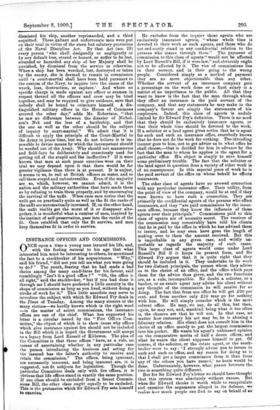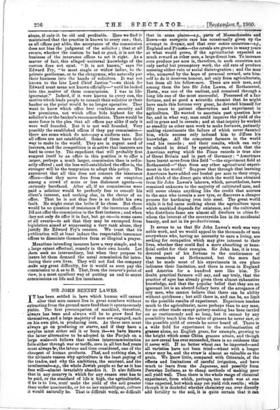INSURANCE OFFICES AND COMMISSIONS.
ONCE upon a time a young man insured his life, and, with the feeling natural to his age that what interested him must be interesting to others, he mentioned the fact to a stockbroker of his acquaintance. "Why," said his friend, "did not you tell me what you were going to do ?" The youth, fearing that he had made a bad choice among the many candidates for his favour, said tremblingly "Isn't it a good office ?" "Oh, the office is all right," said the stockbroker, "but if you had done it through me I should have pocketed a little annuity in the shape of commission as long as you lived, without doing a stroke of work for it." This little anecdote may serve to introduce the subject with which Sir Edward Fry deals in the Times of Tuesday. Among the many sinners or the many victims—we hardly known which is the right word —in the matter of secret commissions, the insurance offices are one of the chief. What has suggested his letter is a circular issued by the "Fire Offi3es Com- mittee," the object of which is to show cause why offices which give insurance against fire should not be included in the Bill which it is hoped the Government will accept as a legacy from Lord Russell of Killowen. The plea of the Committee is that these offices "have, as a rule, no means of ascertaining whether in any particular case the person introducing the business and acting for the insured has the latter's authority to receive and retain the commission." The offices, being ignorant, are necessarily innocent, and being innocent are, it is suggested, not fit subjects for legislation. Though the particular Committee deals only with fire offices, it is obvious that life offices stand in exactly the same position. If one class should be excluded from a Secret Commis- sions Bill, the other class ought equally to be excluded. This is the pretension which Sir Edward Fry sets himself to examine, He excludes from the inquiry those agents who are exclusively insurance agents, "whose whole time is devoted to their work as such agents, and those who do not ordinarily stand in any confidential relation to the persons who insure through them." The payment of commission to this class of agents " would not be affected by Lord Russell's Bill, if it were law," and obviously ought not to be affected by it. The vice of commissions lies in their secrecy. and in their going to the wrong people. Considered simply as a method of payment they are no more objectionable than any other. Whether the servant of an insurance company gets a percentage on the work done or a fixed salary is a matter of no importance to the public. All that they want to know is the fact that the man through whom they effect an insurance is the paid servant of the company, and that any statements he may make in the company's favour are simply the statements of his employers. Indeed, this class of agents is unduly limited by Sir Edward Fry's definition. There is no need that they should be exclusively insurance agents, or that their whole time should be devoted to the work. If a solicitor or a land agent gives notice that he is agent for such and such an insurance office, everybody knows that he does not do the work for nothing. The intending insurer goes to him, not to get advice as to what office be shall choose,—that is decided for him in advance by the fact that the man to whom he applies is the agent for a particular office. His object is simply to save himself some preliminary trouble. The fact that the solicitor or the land agent in question does a variety of other work is of no consequence. In this especial piece of work he is the paid servant of the office on whose behalf he effects insurances.
The other class of agents have no avowed connection with any particular insurance office. Their utility, from the point of view of the company, would be at end if they were known to have such a connection. They are primarily the confidential agents of the persons who effect insurances, and they "are paid commissions by the insur- ance offices, because they know the influence of these agents over their principals." Commissions paid to this class of agents are of necessity secret. The receiver of the commission may conceivably have told his clients that he is paid by the office in which be has advised them to insure, and he may even have gone the length of making over to them the amount received. But this is improbable in any given case, and wildly im- probable as regards the majority of such cases. This large class of agents would come under Lord Russell's Bill if it keeps its present form, and Sir Edward Fry argues that it is quite right that they should be included in it. They undertake to do work for two distinct principals, the 'person whom they advise as to the choice of an office, and the office which pays them for the advice thus given, and the two functions are, as a rule, incompatible. No doubt a solicitor, or a banker, or an estate agent may advise his client without any thought of the commission he will receive for so doing. The fact that from one office he will get £20 per cent. and from another only £10 may go for nothing with him. He will simply consider which is the more solvent office. He may, we say, do all this, but then, Hgain, he may not, and, mankind being what it too often is, the chances are that he will not. In that case, no matter how customary his act may be, he is abusing a fiduciary relation. His client does not consult him in the choice of an office merely to put the largest commission into his pocket. He wants his agent's unbiassed opinion on the comparative merits of half a dozen offices, and what he wants the client supposes himself to get. Of course, if the solicitor, or the estate agent, or the stock- broker were to say; • I strongly advise you to insure in such and such an office, and my reason for doing so is that I shall get a larger commission from it than from any of the others you have named,' no harm would be done. Unfortunately, however, what passes between the two is something quite different. But for Sir Edward Fry's letter we should have thought that this system was absolutely without excuse. But when Sir Edward thinks it worth while to recapitulate and examine ihe arguments alleged in its defence, we realise how much people can find to say on behalf of an abuse, if only-it be- old and profitable. Here we find it maintained that the practice known toevery one ; that, as all offices pay alike. the .accepts,nce of the commission does not bias the judgment of the solicitor ; that at all events, whether the custom be bad or good, it is not the business of the insurance offices to set it right. As a matter of fact, this alleged- universal -knowledge of- the custom does not, exist. "'It is not knewn," says Sir Edward Fry, ". to most single or widow- ladies, to the- private gentleman, or to the clergyman, who naturally put their business into the hands of solicitors. It was not known to the late Lord ,Chief Justice "—We think Sir Edward must mean not known officially—" until he looked into .the..matter of these commissions. I was in like ignorance." Indeed, if it were known to every one, the motive which leads people to consult their solicitor or their banker on the point would be no longer operative. They want to know which office best combines security and low premiums, not which office bids highest for the solicitor's or the banker's recommendation. There would be more force in the plea that all offices pay alike if only it were well founded. But it is not well founded. Very possibly the established offices if they pay commission— there are some which do not—pay a uniform rate. But all offices are not established. Some of them have their way to make in the world. They are in urgent need of insurers, and the competition is so active that insurers are hard to come by. The expedient that will probably first suggest itself, to an office in this position is to offer a larger, perhaps a much larger, commission than is ordin- arily offered ; and the less well-established the office is, the stronger will be the temptation to adopt this policy. The argument that all this does not concern the insurance affices—that they move free from stain or suspicion among a crowd of more or less dishonest agents—is curiously barefaced. After all, if no commissions were paid a solicitor would be perfectly free to consult his client's interest, and nothing else, in the choice of an office. That he is not thus free is no doubt his own fault. He might resist the bribe if he chose. But there would be no question of resistance if the insurance offices lid not offer the commission in the first instance ; and when they not only do offer it in fact, but go on—in aome cases at all events—to .ask that they may be exempted from legislation aimed at suppressing a very rank abuse, they justify Sir Edward Fry's censure. We trust that* its publication will at least induce the respectable insurance offices to dissociate themselves from so illogical a prayer.
Meantime intending insurers have a very simple, and to a large extent effectual, remedy in their own hands. Let them seek no intermediary, but when they propose to insure let them demand the usual commission for intro- lucing their own lives. They will not find the company :nake any great difficulty, for it would as soon pay the commission to A as to B. That, from the insurer's point of view, is a most excellent way of putting an end to secret commissions on life and fire insurance.



































 Previous page
Previous page